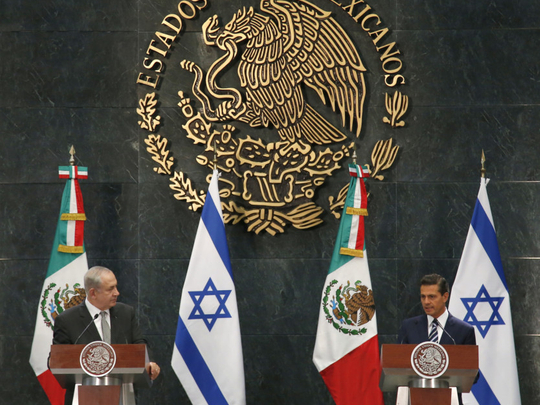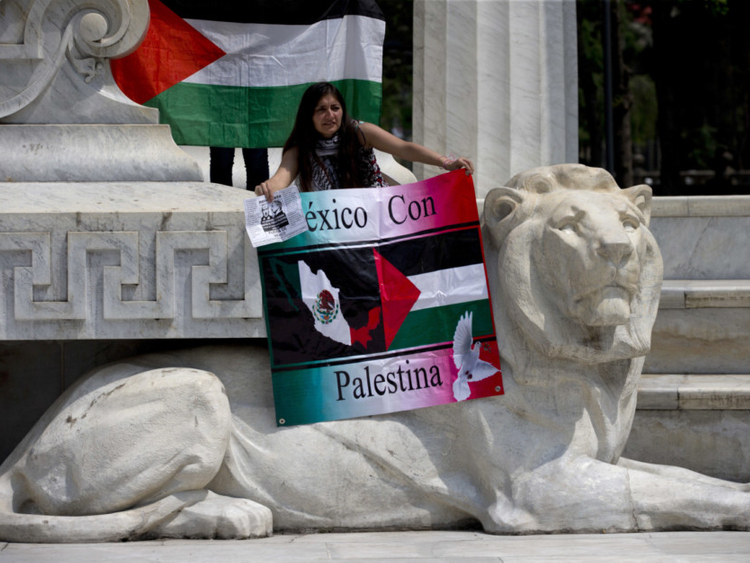
Dubai: Contrary to the view of some that Israel is suffering from a semi-isolation internationally because of its government’s far right wing policies, several political analysts believe Israel is currently living one of its better times, not because of its policies, but because of the weakness of its surroundings.
For the first time since it joined the UN in 1949, Israel last June won an election to chair the United Nations legal committee, one of the six permanent committees of the UN. Today, Israel is “lobbying intensively and systematically”, to win the support to have a seat at the UN Security Council, analysts said.
It is facing some challenges, but it also has some facilitating factors, such as the internal wars in some of the Arab countries that were totally against any kind of normalisation of ties with Israel before solving the Palestinian question. On the other hand, internal Palestinian rift has created “a political paralysis” and benefited Israel, said analysts.
“It is a mixed bag for Israel”, said Ghaith Al Omari, senior fellow at The Washington Institute, and former executive director of the American Task Force on Palestine.
“On the one hand, Israel has been intensively reaching out to new partners around the world and that has produced some results,” said Omari, who was an adviser to the Palestinian negotiating team during the 1999-2001 permanent status talks.
Last week, Benjamin Netanyahu became the first Israeli Prime Minister to visit South America. In July, he hosted his Indian counterpart Narendra Modi.
He also hosted African leaders and visited Africa twice in 2017 — though an Israeli-African summit that was planned in Togo in October was indefinitely postponed.
“Additionally, the emergence of Iran as the main regional threat to both Israel and Arab states has led to limited but unprecedented security cooperation between Israel and some Arab nations,” he said.
However, on the other hand, Israel’s relations with the European countries, which are an important trading partner, are tense because of Israeli policies towards the Palestinians.
“Israel’s economic success and its significant achievements in the fields of security and technology, as well as the diminishing importance of the Palestinian-Israeli conflict in the global arena has helped Israel establish wider international ties,” said Omari.
“Without meaningful progress on the peace process with the Palestinians, however, its relations with Europe are likely to remain strained, and its relations with (some) Arab countries are likely to remain covert and limited to the security sphere,” he concluded.
Many countries established or resumed their diplomatic relations with Israel after the signing of the Oslo Accord in 1993, which was supposed to be the beginning of solving the Palestinian problem — the longest unresolved conflict in modern history. Today, it is estimated that nearly 159 countries have established diplomatic relations with Israel. The number of countries which had diplomatic relations with Israel were higher earlier but after Israeli attacks on Gaza Strip in 2009, some countries cut their ties with Israel.
All attempts in the past years to revive the peace process were unsuccessful. The talks are deadlocked.
While the Palestinians are divided over an internal conflict between Fatah and Hamas, several Arab countries are stuck up with their own issues like chaos and civil wars, especially after the “Arab Spring” which started in late 2010.
“Israel has taken a neutral position on the revolutions in the Arab countries,” said Moataz Salameh, head of the Arab and Regional Studies unit at the Cairo-based Al Ahram Strategic Studies Centre.
“Why would it take any action when it sees that many of the countries that were opposing it earlier are now fragmenting, such as Syria and Libya?” he told Gulf News in an interview.
Lack of any Israeli involvement militarily in Arab issues, “made some analysts think that Israel is weaker than before but this is not true,” Salameh said.
However, if Israeli interests were threatened or attacked, Tel Aviv will respond militarily.
And in case of an Israeli attack, the Arab countries, whom Salameh compared with an injured lion at present, “will gather their strength and mobilise public forces against Israel”.
Meanwhile, there is no development that could force Israel to offer any concessions to the Palestinians at the negotiation table.
There is, also, nothing that makes Israel ready to offer any concessions to the Syrians on the Golan Heights that Israel occupied in 1967 war.
On the contrary, Israel is getting the support of the US Administration of Donald Trump in an unprecedented manner, analysts said.
They referred to several incidents, including the promise of US Ambassador to the United Nations Nikki Haley that “the days of Israel-bashing at the UN are over”.
Recently, Israel started working on minimising the services of The United Nations Relief and Works Agency for Palestine Refugees in the Near East (UNRWA). As a result some of UNRWA’s educational and medical services were discontinued.
“Israel is accomplishing achievements at the UN,” said Hani Al Masri, a West-Bank political analyst.
Israel is also complicating the work of those who support Palestinians, such as Amnesty International, a human rights watchdog.
Israeli daily Haaretz reported last week that Israel intends to penalise Amnesty International for a recent campaign encouraging people to call for boycotts of things produced in Israeli colonies built on West Bank.
“We are still there. We do exist,” and we do have the support of many parties, Masri told Gulf News. Palestinians need to work to have more support and make Israel feel “political, economic, moral and cultural pains” for its policies against the Palestinians.
The alarming issue, to Masri, is that Israel is realising successes while it is headed by such a right-wing government, “so what would be the situation if it is headed by another (left) government that wears a silky gloves but offers the same poison (to Palestinians) in a different way?” He was referring to the view of many Arabs that there is no major difference between Likud and labour parties when it comes to Arab issues.
Last August, US President Donald Trump asked his son-in-law and White House senior adviser, Jared Kushner to lead a US delegation on a Middle East tour aiming to revive the peace talks between Palestinians and Israelis.
During his meeting with Palestinian President Mahmoud Abbas, Kushner asked to give US administration more time before the Palestinians take a unilateral measure in the stalled peace process, Masri said.
But upon his return to Washington, Kushner was quoted as telling a group of interns at the US Congress that he feels the current “US administration will not succeed like previous administrations. (and) undoubtedly, Trump administration will not find a solution that achieve peace between Palestinians and Israelis,” according to several press reports.
Apart from Israeli policies, the Palestinian internal split is hindering peace efforts, said analysts.
Commenting on the US policy on the peace efforts, al Omari said, “an important policy that the US is pursuing is to involve major Arab states, like GCC members, Egypt and Jordan, in the peace process.”
However, “these countries are not interested in replacing the Palestinians [at the peace talks] but rather will help empower the Palestinians negotiators. They will convince Israel that peace with Palestine will open the door to peace with the whole Arab world”, as suggested in the Arab peace initiative endorsed in the 2002 Arab summit in Beirut.













